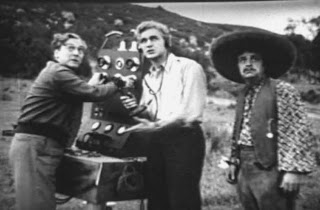Showcase Presents: The War That Time Forgot, Vol. 1 (DC Comics, 2006)
Writer: Robert Kanigher
Artists: Ross Andru, Mike Espisito, Joe Kubert, Gene Colan, and Russ Heath
Rating: Six of Ten Stars
"Showcase Presents: The War That Time Forgot" is 500+ pages of the strangest war comics that DC Comics put out during the 1960s, most of them culled from the appropriately named "Weird War Tales" comic book series.
"The War That Time Forgot" pits the U.S. Navy and Army against dinosaurs on uncharted islands in the Pacific during WW2, showing that giant monsters were running rampant even before the atom bombs were dropped on Nagasaki and Hiroshima. Toss in a few recurring characters--such as the G.I. circus acrobats, The Flying Boots, and their manager-turned-drill sargeant Zig-Zag; the mechanical G.I. Robot; and the Suicide Squad ("the only soldiers who hated each other more than the enemy")--and you've got some entertaining, fast-paced, and quite bizarre war stories.

I won't say the work here is the best that any of the creators involved produced. Andru and Colan both went onto to better work at Marvel during the 1970s, and while Kanigher is as creative as ever here, the flaws that were almost constantly present throughout his work are very clearly on display... and amplified as you read the stories in this book back-to-back.
Kanigher had a habit of enfusing stories with a theme that ran heavy-handed through the events of the story and ultimately played an equally heavy part in the resolution or moral. He also had a habit of having things happen in threes--such as the soldier testing the G.I. Robot criticising it three times for being an unfeeling, unthinking machine... before it strangely breaks programming and rescues him from certain doom without being ordered to do so.
The weaknesses, however, in this book are outweighed by its strengths--fun stories and decent (if not spectacular) artwork.
"Showcase Presents: The War That Time Forgot" is available from Amazon.com for less that $12. I think it's a book that a young boy that you want to encourage to read will enjoy... it's got soldiers, guns, robots, and dinosaurs. What more could a 2nd or 3rd-grader ask for between two covers? For the adult reader, I think these stories get old fast, but I think a kid will enjoy them immensely.





















.jpg)






.jpg)
